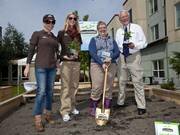The P-Patches are the most visible evidence of Seattle's unstoppable green thumb. Established in the '70s, when Seattle was emptying out and lots stood vacant, they've survived at least two major real estate booms since then, thanks to the pitchfork lobbyists of the P-Patch Trust, Seattle Tilth, and others.
The City of Seattle oversees 73 P-Patches in conjunction with the Trust, which works out to 1,900 plots over 23 acres. The largest and oldest, northeast Seattle's Picardo P-Patch, looks bucolic enough, but plenty of people can think of "better" uses for that land, including neighboring University Prep. Meanwhile, plenty of other people just want in; the P-Patch wait list can be 3-5 years long.
That kind of entrenchment--this here's our land, we farm it!--is why you don't see vacant lots today sprouting greenery right and left. Developers are skeptical about how temporary P-Patches turn out to be. And the best use of public space is not a fight the city wants to be in the middle of, either. That's why the Trust exists, to get P-Patches off the city's Parks holdings: Actual parks, open to all, are a slam-dunk. But city sponsorship of what are essentially "private" garden plots with no term limits is a more contentious issue.
Urban farming, in contrast, isn't "just" about P-Patches. In Seattle, you can now get a free permit online to cultivate your parking strip. We're talking about the works, raised beds, what-have-you. But the city is looking at going even further, reports Urban Farm Hub, to encourage people to take hoes in their own hands. If all goes well, city dwellers may be able to plant up to 4,000 sq. ft. without a permit....


Most Recent Comments